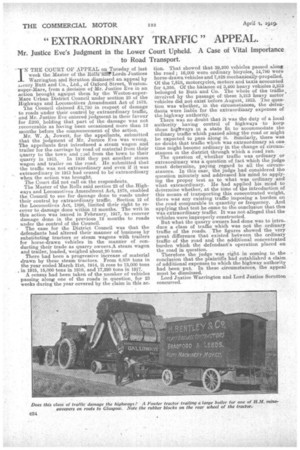"EXTRAORDINARY TRAFFIC" APPEAL.
Page 12

If you've noticed an error in this article please click here to report it so we can fix it.
Mr. Justice Eve's Judgment in the Lower Court Upheld. A Case of Vital Importance to Road Transport.
I N THE COURT OF APPEAL on Tuesday of last week the Master of the Rolls Mit/Lords Justices Warrington and Scrutton dismissed an appeal by itenry Butt and Co., Ltd., of Oxford Street, Westonsuper-Mare, from a decision of Mr. Justice Eve in an action brought agaipst them by the Weston-superMare Urban District Council under section 23 of the Highways and Locomotives Amendment Act of 1E378.
The Council claimed £1,750 in respect of damage to roads under their control by extraordinary traffic, and Mr. Justice Eve entered judgment in their favour for 2280, holding that part of the damage was not recoverable as having been occasioned more than 12 months before the commencement of the action.
Mr. W. A. Jowett, for the appellants, submitted that the judgment of Mr. Justice Eve was wrong. The appellants first introduced a steam wagon and trailer for the carriage by road of material from their quarry to the town and coal from the 'town to their
quarry in 1913. In 1916 they put another steam wagon and trailer on the road. He submitted that the traffic was not extraordinary and even if it was extraordinary in 1913 had ceased to be extraordinary
when the action was brought. , The Court did not call on the respondents.
The Master of the Rolls said section 23 of the. Highways and Locomotives Amendment Act, 1878, enabled the Council to sue for damage done to roads under their control by extraordinary traffic. Section 12 of the Locomotives Act, 1898, limited their right to recover to damage done within 12 months. The writ in this action was issued in February, 1917, to recover damage done in the previous 12 months to roads under the control of the Council.
The case for the District 'Council was that the defendants had altered their manner of business by substituting tractors or steam wagons with trailers for horse-drawn Vehicles in the manner of conducting their trade as quarry owners..A. steam wagon and trailer, loaded, weighed about,20 tons.
There had been a progressive increase of material drawn by these steam tractors. From 6,838 tons in. the year ended. March 31st, 1914, it rose to 13,000 tons in 1915, 15,000 tons in 1916, and 17,220 tons in 1917. A census had been taken of the number of vehicles passing along one of the roads in question, for 23 weeks during the year covered by the claim in this ac tion. That showed that 39,200 vehicles passed along the road ; 16,000 were ordinary bicycles, 14,780 were horse-drawn vehicles and 7,8M mechanically-propelled. Of the 7,818, motorcycles, motors and taxis accounted for 4,358. Of the balance of 3,460 heavy vehicles 3,213 belonged to Butt and Co. The whole of the traffic involved by the passage of 'these 3,213 heavy motor ' vehicles did not exist before August, 1913. The question was whether, in the circumstances, the defendants were liable for the extraordinary expenses of the highway authority. There was no doubt that it was the duty of a local authority having control of highways to keep these highways in a state fit to accommodate the ordinary traffic which passed along the road or might he expected to pass along it. Similarly, there was no doubt that traffic which was extraordinary at one time might become ordinary in the change of circumstances in the district through which a road ran. The question of whether traffic, was ordinary or extraordinary was a question of fact which the judge must determine, paying regard to all the circumstances. In this case, the judge had considered the question minutely and addressed his mind to applying the proper test as to what was ordinary and what extraordinary. He had applied his mind to determine whether, at the time of the introduction of this means of transporting this concentrated weight, there was any existing traffic imposing a burden on the road comparable in quantity or frequency. And applying that test he came to the conclusion that this was extraordinary traffic-. It was not alleged that the vehicles were improperly constructed.
But what the quarry owners had done was to introduce a class of traffic which was not the ordinary traffic of the roads. The figures showed the very great difference that existed between the ordinary traffic of the road and the additional concentrated burden which the defendant's operation placed on the road in question.
Therefore the itidge was right in coming to the conclusion that the plaintiffs had established, a claim of additional expenses to which the highway authority had been .put. In these circumstances, the appeal must be dismissed.
Lord Justice Warrington and Lord Justice Scrutton concurred.






















